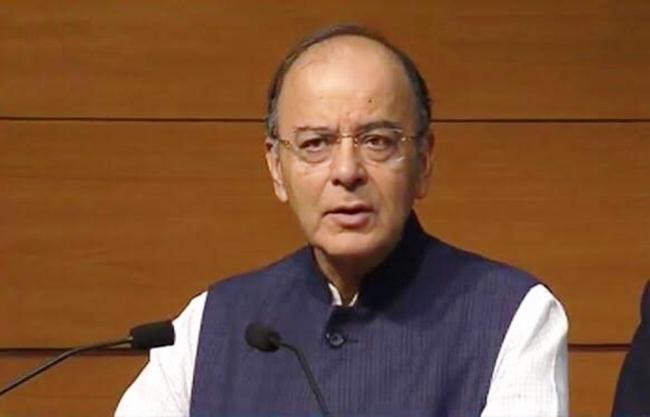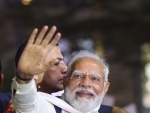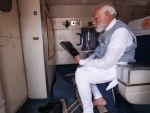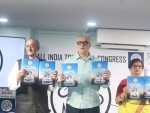
Mamata, Rahul playing with India's sovereignty: Arun Jaitley on NRC
New Delhi, Aug 1 (IBNS): Union Finance Minister Arun Jaitley on Wednesday criticised West Bengal Chief Minister Mamata Banerjee and Congress President Rahul Gandhi over their stance on NRC issue in Assam and said they should realise that 'sovereignty of India' is not a matter to play with.
Jaitley said the Congress is compromising with the sovereignty of India.
"I reiterate what I have stated earlier. The Congress was the mainstream party on Indian politics. It has increasingly started taking fringe position. Siding with the ‘Tukde Tukde’ gang was one such illustration. It is now compromising the sovereignty of India," Jaitley said referring to the opposition parties.
I reiterate what I have stated earlier. The Congress was the mainstream party on Indian politics. It has increasingly started taking fringe position. Siding with the ‘Tukde Tukde’ gang was one such illustration. It is now compromising the sovereignty of India.
— Arun Jaitley (@arunjaitley) August 1, 2018
He further said: "Leaders like Rahul Gandhi and Mamata Banerjee must realise that India’s sovereignty is not a play thing. Sovereignty and citizenship are the soul of India. Imported vote banks are not."
Leaders like Rahul Gandhi and Mamata Banerjee must realise that India’s sovereignty is not a play thing. Sovereignty and citizenship are the soul of India. Imported vote banks are not.
— Arun Jaitley (@arunjaitley) August 1, 2018
In his social media post, Jaitley also cited Mamata Banerjee’s argument from 2005 when she spoke against ‘infiltration in Bengal’.
"The West Bengal CM, Mamata Banerjee has stated in the LS on 4.8..2005: 'The infiltration in Bengal has become a disaster now... I have both the Bangladeshi & the Indian voters list. This is a very serious matter. I would like to know when would it be discussed in the House?."
The West Bengal CM, Mamata Banerjee has stated in the LS on 4.8..2005: “The infiltration in Bengal has become a disaster now... I have both the Bangladeshi & the Indian voters list. This is a very serious matter. I would like to know when would it be discussed in the House?”
— Arun Jaitley (@arunjaitley) August 1, 2018
Sparking fears of deportation, India on Monday announced exclusion of about four million people from citizenship in the northeastern state of Assam bordering Bangladesh after a draft National Register of Citizens (NRC) was published.
Those excluded from the list could not prove their citizenship by providing valid documents and they are mostly Muslim immigrants who came to Assam before 1971, when millions fled Bangladesh’s war of independence.
Mamata trades gun against BJP over NRC:
Visiting New Delhi, West Bengal Chief Minister Mamata Banerjee on Wednesday met Congress president Rahul Gandhi and ex-party supremo Sonia Gandhi here and later said the ruling BJP is nervous about the outcome of the 2019 general elections.
Mamata has been criticising the ruling BJP over the NRC issue.
Speaking to reporters after meeting Rahul Gandhi and Sonia Gandhi, Mamata said the ruling Bharatiya Janata Party was 'nervous' about its prospect of returning to power after the Lok Sabha polls in 2019.
"BJP is politically nervous. They know they won't come back to power in 2019. So they are not speaking responsibly, We won't respond to abuse with abuse. It is not our culture. We believe in the politics of courtesy," Mamata said attacking the BJP.
She said all opposition parties should work together to defeat the BJP.
"In 2019 it will be collective leadership. First priority is to remove BJP. We will fight together. Whichever party is strong, will fight in respective states. We are strong in our State. We can fight on our own," Mamata said.
Full text of Arun Jaitley's Facebook text is given below:
Territory and citizens are the two most important aspects of a sovereign State. The principal duty of any Government is to defend the borders of the country, prevent any trespass and make the life of its citizens safe and secure. Independent India has faced a major challenge to protect its sovereignty in Jammu and Kashmir. At the time of Independence and partition of India, Assam was also a sore issue for Pakistan. They resented the fact that like Kashmir, Assam became a part of Independent India. Zulfikar Ali Bhutto, in his book ‘Myth of Independence’ wrote:
“It would be wrong that Kashmir is the only issue that divides India and Pakistan, though undoubtedly the most significant. One at least is nearly as important as the Kashmir dispute, is that of Assam and some districts of India adjoining the East Pakistan. To these Pakistan has very good claims.”
Similarly, in the pre-1971 era, till he became more favourably inclined to India, Sheikh Mujibur Rahman, the then East Pakistan leader, in his book ‘Eastern Pakistan, its Population and Economics’ had observed:
“Because Eastern Pakistan must have sufficient land for its expansion and because Assam has abundant forest and mineral resources, coal, petroleum etc., Eastern Pakistan must include Assam to be financially and economically strong.”
Ever since Independence, we had a significant influx of illegal migrants from East Pakistan. Because of ethnic and linguistic similarity and religious commonality, it was possible for these people together to avoid detection and find a shelter in Assam.
Who are citizens of India?
The citizenship of India is recognized from Articles 5 to 11 of the Constitution of India. No citizenship can be granted in violation of these provisions. The law relating to citizenship which regulates the grant of citizenship by birth, by registration, descent and naturalisation. Section 6(A) deals with the special provisions of citizenship covered by 1985 Assam Accord.
Consequences of illegal migration
Twenty-one years ago, on May 6, 1997, the then Home Minister Shri Indrajit Gupta, told Parliament that there were over 10 million illegal immigrants residing in India, of which 5.4 million were in West Bengal and 4 million in Assam. Needless to say that this figure has increased ever since. The consequence of this was analysed by the Hon’ble Supreme Court in a case filed by the present Chief Minister of Assam, Sarbananda Sonowal vs UOI (2005), where the court held:
‘The dangerous consequences of large scale illegal migration from Bangladesh, both for the people of Assam and more for the Nation as a whole, need to be emphatically stressed. No misconceived and mistaken notions of secularism should be allowed to come in the way of doing so. As a result of population movement from Bangladesh, the spectre looms large of the indigenous people of Assam being reduced to a minority in their home State. Their cultural survival will be in jeopardy, their political control will be weakened and their employment opportunities will be undermined. The silent and invidious demographic invasion of Assam may result in the loss of geostrategically vital districts of lower Assam. The influx of these illegal migrants is turning these districts into a Muslim majority region. It will then be a matter of time when a demand for their merger with Bangladesh may be made. The rapid growth of international Islamic fundamentalism may provide for driving force for this demand. In this context, it is pertinent that Bangladesh has long discarded secularism and has chosen to become an Islamic State. Loss of lower Assam will severe the entire land mass of North-East, from the rest of India and the rich natural resources of that region will be lost to the Nation.” Nobody could have put it better.
The two accords by Mrs. Indira Gandhi and Mr. Rajiv Gandhi
Subsequent to the creation of Bangladesh in 1971, the Indian and the Bangladeshi Prime Ministers entered into an arrangement in February, 1972. The Government of India, on 30th September, 1972, set out a circular that those Bangladeshi nationals who had come to India before 25th March, 1971 were to be detected but those who entered India in or after the said date were to be repatriated. This is what Mrs. Indira Gandhi’s commitment to India and the people of this nation was.
Under the Assam Accord signed on 15th August, 1984, the Rajeev Gandhi Government committed to three categories. Those who came prior to 1.1.1966 will continue to be on India’s electoral rolls and they would be regularised. Foreigners who came to Assam after 1.1.1966 but before 24.3.1971 would be dealt with under the provisions of the Foreigners Act and Foreigners Tribunal Order 1964. If detected, their name would be deleted from the electoral rolls and they would have to register themselves as foreigners. Those who came on or after 25.3.1971 were to be detected, deleted and expelled in accordance with law. “Immediate and practical steps should be taken to expel such foreigners”.
Thus historically, both Mrs. Indira Gandhi and Mr. Rajeev Gandhi, through the Congress Government that they headed, committed to this nation that post 25th March, 1971 migrants would be detected, identified and deported.
Under the Foreigners Act, the onus of proof lies on the persons claiming to be a citizen. It would otherwise be impossible for the State to establish when the person surreptitiously entered the Indian territory. However, the Congress Government legislated the IMDT Act which remained silent on the issue of burden of proof. This virtually made detection, deletion and deportation impossible. The Supreme Court, on 12th July, 2005 struck down the IMDT Act and unconstitutional and, therefore, decided that the detection would be under the Foreigners Act and the rules made thereunder. It is, thereafter, that tribunals for preparing the register of members have been functioning in the districts of Assam.
West Bengal is not far behind
To put it in the words of the Trinamool Congress leader and the West Bengal Chief Minister, Mamata Banerjee has stated in the Lok Sabha on 4.8..2005:
“The infiltration in Bengal has become a disaster now. You can see the Bangladeshi as well as the Indian names in the list. I have both the Bangladeshi and the Indian voters list. This is a very serious matter. I would like to know when would it be discussed in the House?”
India’s sovereignty is paying a heavy price because of the quality of its political discourse. Though Mrs. Indira Gandhi and Mr. Rajiv Gandhi took a particular position in 1972 and 1985 for the deletion and deportation of foreigners, Rahul Gandhi takes a contrarian position and his party turns turtle. Similarly, the BJP ally of 2005, Ms. Mamata Banerjee, took a particular position. As a federal front leader, she now talks to the contrary. Can India’s sovereignty be decided by such fickle minds and fragile hands?
The result of this has been that in the 50 years between 1961 and 2011, the majority community in Assam has grown 2.4 times; the minority has grown 3.9 times. This has caused a major demographic impact. Difference between a citizen, refugee and an illegal migrant There is a fundamental difference between a citizen and a refugee. Citizenship is regulated by the Constitution. Those who are compelled on account of certain circumstances to leave their country and take refuge in another country for fear of persecution, are refugees. The receiving nation can, on humanitarian ground, be considerate to these refugees in terms of providing them the basics of life. Refugees are not conferred citizenship. The refugees don’t become a voter. Some pre-1971 migrants may have moved for reasons of persecution, the same is not true of all post 1971 migrants who have illegally entered India. There is a third category who are neither citizens nor refugees, who come for reasons of economic opportunities. These are illegal migrants. Their entry is silent invasion in the country to which they move. One of the world’s most celebrated liberal judges, Lord Denning, in his book ‘The Due Process of Law’ has written as introduction to part 5 ‘Entrances and Exits’ where the opening paragraph reads:
“In recent times England has been invaded not by enemies nor by friends but by those who see England as haven. In their own countries, there is poverty, disease and no homes. In England there is social security, a national health service and guaranteed housing. All to be had for the asking without payment and without working for it. Once here, each seeks to bring his relative to join him: so they multiply exceedingly.”
Ironically even Lord Denning calls it an invasion. It must be remembered that citizenship does not accrue by illegal migration. It comes under the conditions prescribed in the Constitution and the Citizenship Act.
Difference between fundamental rights under Article 19 and 21
A desperate argument has been given that this is a human rights cause. A refugee on account of persecution may have a humanitarian consideration. Illegal migration does not have it. There is not fundamental right to any person to do so. The wise men who framed India’s Constitution made a clear distinction in the phraseology of Article 19 which guarantees the right to move freely throughout the territory of India and to reside and settle in any part of territory of India. It is a right available only to a citizen. However, the right to life and liberty and a protection against its deprivation under Article 21 is available to any person – citizen and non-citizen alike. A right of a citizen or a non-citizen to life and liberty can be taken away only by due process of law. That is a right available to him under India’s constitution. That is his human right. But the framers of the Constitution did not confer on a non-citizen the right to move throughout the territory of India or to reside or settle in any part or territory in India. While the constitution framers make Article 19 applicable to a ‘’citizen’ only, the rights under Article 21 were made available to a ‘person’. There is a method in this distinction.
I reiterate what I have stated earlier. The Congress was the mainstream party on Indian politics. It has increasingly started taking fringe position. Siding with the ‘Tukde Tukde’ gang was one such illustration. It is now compromising the sovereignty of India. Leaders like Rahul Gandhi and Mamata Banerjee must realise that India’s sovereignty is not a play thing. Sovereignty and citizenship are the soul of India. Imported vote banks are not."
Support Our Journalism
We cannot do without you.. your contribution supports unbiased journalism
IBNS is not driven by any ism- not wokeism, not racism, not skewed secularism, not hyper right-wing or left liberal ideals, nor by any hardline religious beliefs or hyper nationalism. We want to serve you good old objective news, as they are. We do not judge or preach. We let people decide for themselves. We only try to present factual and well-sourced news.







